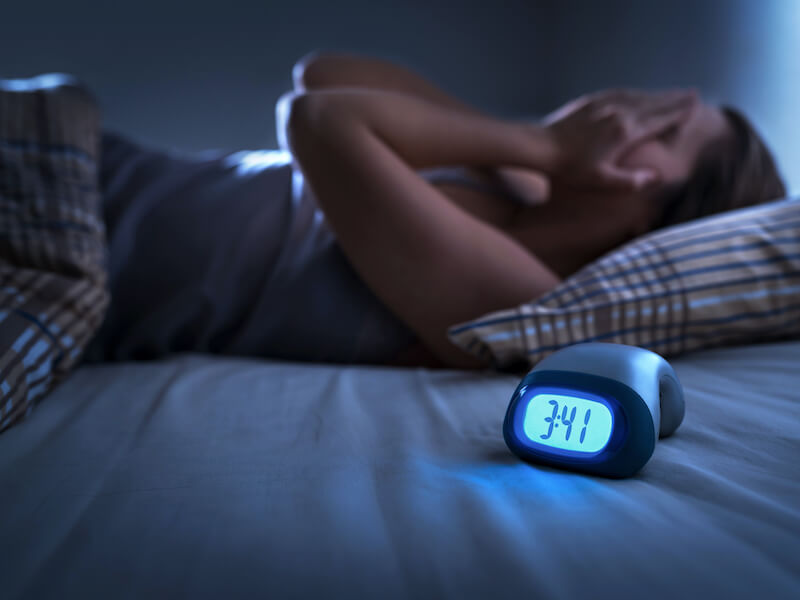You’re lying in bed trying to sleep when you first notice the sound: a pulsing or maybe a throbbing–possibly a whooshing–right in your ear. The sound is rhythmic, in tune with your heartbeat. And once you notice that sound, you can’t tune it out. It keeps you awake–which is bad because you need your sleep and you’ve got a big day tomorrow. And suddenly you feel very anxious–very not sleepy.
Does this sound familiar? Turns out, tinnitus, anxiety, and sleep are closely related. And you can see how tinnitus and anxiety might easily conspire to create a vicious cycle–one that deprives you of your sleep, your rest, and can impact your health.
Can Anxiety Cause Tinnitus?
Tinnitus is generally defined as a ringing in the ears. But it’s a little more complicated than that. First of all, the actual sound you hear can take a wide variety of shapes, from pulsing to throbbing to ringing and so on. But, essentially, you’re hearing a sound that isn’t really there. For many, tinnitus can occur when you’re feeling stressed out–which means that stress-related tinnitus is definitely a thing.
An anxiety disorder is a condition in which feelings of fear, worry, or (as the name implies) anxiety are difficult to control and strong enough to interfere with your daily life. This can manifest in many ways physically, including as tinnitus. So can anxiety cause tinnitus? Absolutely!
Why is This Tinnitus-Anxiety Combo Bad?
There are a couple of reasons why this particular combination of tinnitus and anxiety can lead to bad news:
- First, tinnitus can often be the first sign of a more serious anxiety attack (or similar episode). Once you’ve made this connection, any occurrence of tinnitus (whether caused by anxiety or not) could cause a spike in your overall anxiety levels.
- Most people tend to notice tinnitus more often at night. Can anxiety cause ringing in the ear? Sure–but it’s also possible that ringing’s been there all day and your usual activities were simply loud enough to mask the sound. This can make falling asleep a little tricky. And that insomnia can itself lead to more anxiety.
Often, tinnitus can start in one ear and move to the other. Sometimes it can stick around 24/7–all day every day. In other cases, it might pulsate for a few minutes and then go away. Either way, this anxiety-tinnitus-combo can present some negative impacts on your health. Especially in terms of the following.
How Does Tinnitus-Anxiety Impact Your Sleep?
So, yeah, anxiety-driven tinnitus could easily be causing your sleep issues. Here’s just one example of how:
- The sound of your tinnitus can stress you out and be difficult to ignore. If you’re laying there just trying to fall asleep, your tinnitus can become the metaphorical dripping faucet–keeping you awake all night. As your anxiety about sleeping increases, the sound of the tinnitus can grow louder and even harder to tune out.
- Most people sleep in environments that are intentionally quiet. It’s night, so you turn everything off. But when everything else is quiet, your tinnitus can grow much more noticeable.
- The longer you go without sleep, the easier it is for you to become stressed. The more stressed you are, the worse your tinnitus will tend to become.
When your anxiety is causing your tinnitus, you may hear that whooshing sound and fear that an anxiety attack is coming. This can, understandably, make it very difficult to sleep. The problem is that lack of sleep, well, kind of makes everything worse.
Health Impacts of Lack of Sleep
As this vicious cycle continues, the health impacts of insomnia will grow much more significant. And this can really have a detrimental impact on your wellness. Some of the most common impacts include the following:
- Increased stress and worry: When you don’t sleep, it makes those anxiety symptoms already present even worse. This can lead to a vicious cycle of mental health-related symptoms.
- Poor work performance: It should come as no surprise that if you can’t sleep, your job performance will suffer. You won’t be as enthusiastic or be able to think on your feet as quickly.
- Slower reaction times: When you aren’t getting enough sleep, your reaction times are more lethargic. This can make daily activities such as driving a little more dangerous. (And it’s especially hazardous if you operate heavy machinery, for example.)
- Increased risk of cardiovascular disease: Over time, lack of sleep can begin to impact your long-term health and wellness. You could find yourself at an increased risk of heart disease or stroke.
Other Causes of Anxiety
Tinnitus, of course, is not the only cause of anxiety. And understanding these causes is important (mostly because they will help you avoid anxiety triggers–which as an added bonus will help you avoid your tinnitus symptoms). Some of the most common causes of anxiety include the following:
- Medical conditions: In some cases, you may simply have a medical condition that makes you more prone to a heightened anxiety response.
- Stress response: When something causes us great stress, our bodies will naturally go into an anxious mode. That’s great if you’re being chased by a lion. But it’s less good when you’re working on a project for work. Sometimes the relationship between the two is not obvious. Something that caused a stress response last week could cause an anxiety attack tomorrow. You may even have an anxiety attack in response to a stressor from last year, for example.
- Hyperstimulation: For some people, getting too much of any one thing–even a good thing–can cause an anxiety episode. For example, being around crowds can sometimes cause an anxiety response for some.
- Other factors: Less commonly, anxiety disorders may be caused by some of the follow factors:
- Some recreational drugs
- Use of stimulants (including caffeine)
- Fatigue and sleep deprivation (see the vicious cycle once again)
- Lack of nutrition
This list is not exhaustive. And if you think you have an anxiety disorder, you should talk to your provider about treatment options.
How to Fix Your Anxiety-Caused Tinnitus?
When it comes to anxiety-related tinnitus, there are two basic options at hand. You can either try to treat the anxiety or treat the tinnitus. Here’s how that might work in either case:
Treating Anxiety
In general, anxiety disorders are treated in one of two ways:
- Cognitive-behavioral Therapy (CBT): This therapeutic approach will help you recognize thought patterns that can unintentionally exacerbate your anxiety symptoms. By interrupting these thought patterns, patients are able to more successfully avoid anxiety attacks.
- Medication: In some cases, medication may help you deal with your symptoms or make your symptoms less noticeable.
Treating Tinnitus
Tinnitus can be treated in a variety of different ways, especially if it presents while you’re sleeping. Some of the most common treatments include:
- Cognitive-Behavioral Therapy (CBT): When you have tinnitus, CBT strategies can help you create new thought patterns that accept, acknowledge, and minimize your tinnitus symptoms.
- White noise machine: When you’re trying to sleep, use a white noise machine. This may help mask your tinnitus symptoms.
- Masking device: Think of this as a white noise machine you wear next to your ears. This can help minimize how much you notice your tinnitus.
Addressing Your Tinnitus Could Help You Sleep Better
As long as that thrumming or whooshing is keeping you up at night, you’ll be at risk of falling into one of these vicious cycles, fueled by anxiety and tinnitus. One solution is to focus on fixing your tinnitus first. To do that, you should contact a hearing specialist–because if you’re focused less on that noise, you could finally get a good night’s sleep. And that’s a dream worth achieving.
Find a provider in your area to schedule an appointment by searching providers near you.



